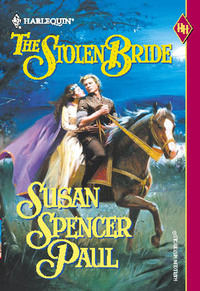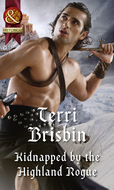Kitap dosya olarak indirilemez ancak uygulamamız üzerinden veya online olarak web sitemizden okunabilir.
Kitabı oku: «The Stolen Bride», sayfa 4
His clear blue eyes regarded her steadily, as if he didn’t quite believe her. “You’re still shaking. Come and sit in the shade.” He lightly grasped her elbow and led her toward the river. As they walked, he looked about and said, somewhat grimly, “Your father disappeared almost as soon as Sir Griel and his men arrived.”
“He’s not very brave,” Sofia admitted.
“Nay, he is not,” Kayne agreed. “Not even for the sake of his own daughter—his only child.”
Large oak trees grew along the riverbank, and their shade was much sought after by the feasters. But as Kayne and Sofia approached, all those near the river stood aside, making way for them with broad smiles and knowing winks. Kayne scowled and ignored them, choosing a private place to sit a bit farther from the water, beneath a tree where a small patch of grass made a more comfortable place to sit.
Sofia gave a sigh of relief as she tucked the skirt of her surcoat about her legs. “It began as such a wonderful day,” she said. She looked up to where Kayne was standing, leaning against the tree with his arms folded across his chest. “You came,” she said, as if she’d only just realized it.
“I came,” he replied, “and now that I am here, you will do as you said and make me your promise.”
Sofia didn’t know what he meant at first, but finally she remembered. “You are good to have helped me today—and also before, but I cannot ask you to rescue me every time Sir Griel behaves in such a manner. I am already afraid that he will do what he can to kill you for what you have done this day alone.”
“Sir Griel is a knave to be wary of, just as I told you,” he said, “but I am a careful man.”
Sofia gave a slight shake of her head. “You have just told him that you will not fight, save to defend yourself and others. ’Tis a powerful advantage you’ve given him.”
“Mayhap,” he said with a slight shrug. “But mayhap I have taken an advantage, as well.”
“I do not understand you, Kayne the Unknown. I dislike sharing any belief with Sir Griel, but he spoke aright when he said that you are not a common man. And not a common soldier. You fight like no other I have seen.”
“And you have seen many battles, then?” he asked, a smile tilting his lips.
“Nay,” she said, frowning, “but I have attended tournaments in plenty. Not even the most seasoned knights had such skill as you showed this afternoon.”
“Then they never served in France. Even common soldiers learn how to fight well—very well—when enough battle makes it necessary. If they do not, they die.”
Two young women approached them, one carrying two tankards of ale and the other a basket brimming with choice bits of roasted meats, chunks of bread and cheese, and a variety of the many sweets being offered at the faire. They were gifts from many of the sellers, in gratitude for what Kayne had done in keeping Sir Griel from ruining the day.
“Thank you,” Sofia said, accepting the basket and setting it on the ground. The young women blushed and smiled at Kayne as he held out his hands to receive the tankards. When he murmured his own thanks, they giggled behind their hands and then curtseyed and hurried away. Kayne gave a shake of his head, watching them depart, and Sofia laughed.
“You will have every maid in Wirth in love with you,” she told him, “and every man jealous of you.”
Kayne sat beside her, handing her one of the tankards. “I will pray it is not so. Women destroy a man’s peace more easily than swords and arrows. Especially women in love.”
Sofia smiled to cover the pain the words wrought in her, and said, a little too merrily, “Are you hungry, Master Kayne?”
“Aye. It is one of the reasons I came. To eat and dance and…and to make merry.” He sounded as if he were embarrassed by the words. Before she could reply he added, in a firmer tone, “You have not yet given me your promise, Sofia.”
“Please, let us not speak of Sir Griel now,” she said, handing him a linen napkin filled with the choicest bits of meat. “Let us eat and dance and prepare our boats for making wishes.”
He looked stubborn, as if he would press the matter, but Sofia touched his hand and murmured, “Please, Kayne. Only let us enjoy the day. I will give you my promise when ’tis done, I vow.”
“Very well,” he agreed reluctantly, “I will wait. But only ’til dark falls. Then I will have your promise regarding Sir Griel.”
“Aye,” Sofia agreed demurely, “you will have it then.”
Chapter Six
Sofia found reason upon reason long after dark had fallen to put off making her promise—there was dancing to be taught, more feasting to be done, and they most certainly had to watch all of the contests and games—until Kayne began to wonder why so simple a matter troubled her so. But those moments that he did think of it were fleeting. Sofia had a talent for making him forget everything…save her.
He had dallied with pretty maids before, especially at Briarstone and while he was in France. He knew the pleasure of a woman’s smile, of holding a soft, feminine body close to his own as they twirled about in a dance—despite his great clumsiness and lack of skill. But what he had experienced before was as nothing compared to receiving Sofia’s smiles, or of holding her as closely as he dared before so many watchful and interested eyes.
He had never seen her like this before. Today, she wasn’t the lady of Wirth, ever concerned with the welfare of those beneath her care. Today she was all laughter and gaiety, so carefree and open and free of spirit that he couldn’t think of words to describe it, and so beautiful—God’s mercy, she was so very beautiful. He could look at her forever and never grow weary, regardless of what time would do to age her. Sofia’s beauty was far beyond the physical, though heaven knew that she was passing all pleasure to gaze upon. It was something that shone out from within, from her beguiling blue eyes and that bewitching smile. And that was just what he felt she had done—cast some spell to captivate him so entirely. It was a feeling Kayne didn’t like in the least, but knew himself as being helpless against.
Teaching him to dance properly was the first task Sofia set herself to once they’d finished their afternoon repast. Kayne was terrible at such a fine skill, and knew it. More times than he could remember he’d made the attempt to learn the simplest steps, but it had ever proved impossible. In the end, he’d merely moved about as best he could and tried not to knock anyone over. He had noticed, with a measure of relief, that he wasn’t alone in his clumsy attempts, and that others dancing near him had seldom taken offense at his lack of grace.
It was much the same in the waning afternoon of Midsummer Day as Sofia tried to teach him to dance, but a far greater pleasure than any previous attempt Kayne had made. She held his hands and made him watch her movements—this he did willingly and with much interest—and physically turned him about in time to the music. To be so exposed to the curious eyes of the villagers would have been a torment to him before, but Sofia’s joy-filled smiles and bright laughter held him too enchanted to think of how badly he might be humiliating himself. Indeed, after but a few moments she had him laughing, too, most especially at his many missteps and mistakes. Being clumsy had never been so great a pleasure.
They danced for what seemed like hours, laughing, twirling, gasping for breath until Kayne had to cry for mercy. Sofia shook her head and called him a very poor creature, but took his hand and led him to a nearby booth where ale was being sold. Bearing their tankards in their hands, Sofia next drew him to the shade of a tree where they sat and watched the contest of archery. At first, Kayne’s years of warring came back to him and he began to think of the hundreds of archers who’d fought beside him in the king’s army, but the contest soon became so close between two of the men that he forgot the war altogether, and watched intensely as each of the archers strove to best the other.
“Do you know how to shoot?” Sofia asked.
“Aye,” Kayne answered absently, fixed upon the archers.
“Did you shoot often during the war?”
“Not often. I was not so exact as others were. The sword is where my skill lies.”
“That I well believe, Master Kayne,” she said, gazing at him with a teasing smile, “having seen the proof with my own eyes. Will you like to see the wrestling contest that follows this? Or perhaps one of the races?”
“Whichever pleases you best,” he replied, though he hoped she’d choose the wrestling. She did.
As darkness began to fall the bonfires were lit with great ceremony, and there was a great deal more feasting. Sir Malcolm had finally returned and greeted Kayne in his cheerful, lordly manner. He gave Sofia permission to bring Kayne to eat at the manorial table, where Sir Malcolm and several of his favorite ladies sat, and there they enjoyed the choicest victuals to be had at the faire.
Sir Malcolm toasted Kayne’s earlier valor as if he’d actually been present to see it, in such a loud, boisterous manner that Kayne began to wish he could find a way to escape. When Sofia suggested that they join many of the other festival goers in search of St. John’s fern in the forest, he happily agreed.
Kayne had never believed the rumors that told of St. John’s fern being graced with magical powers on Midsummer Night, but Sofia clearly did. She pulled Kayne into the darkest part of the forest in an effort to leave the other searchers behind. With only the light of the moon to guide them, it was very dark, indeed.
“’Twill be impossible to find any of the fern without a lantern,” Kayne told her, to be hushed by Sofia.
“Shhh, else the others hear us and know where we search. Look for the fern’s yellow blossom. It should be easy enough to see, for tonight it will shine like gold.”
Kayne uttered a sigh, but dutifully began to peer through the darkness at the bases of trees and shrubs in search of a golden blossom. He tried to keep his thoughts on his task, but he couldn’t seem to stop himself from glancing time to time at where Sofia was searching, her long, unbound hair falling forward as she bent over, inspecting promising spots. The light-blue surcoat she wore was luminous in the dark, turning her elegant form into that of a ghostly spirit.
He felt again the strength of the pull she held for him, and was unsettled by it. ’Twas well enough to dally with a lady such as Sofia on a night like this—aye, and even expected, for dallying was a large part of merrymaking days—but this one indulgence was all that he could allow. On the morrow, he must put aside every thought of Mistress Sofia Ahlgren save that which was most noble—to protect her from the cruelties of Sir Griel. Apart from that, there could be nothing else between them.
A loud cheering in another part of the forest revealed that someone else had found the first blossom of Saint John’s fern and, hearing it, Sofia straightened and made a sound of great unhappiness.
“By the Rood!” she muttered. “They’ve won the greatest measure of magic, but there will still be plenty for the rest of us. Hurry, Kayne! We must find one before ’tis time to set our wishes to sail in the river!”
“Before that time comes,” he said, setting his fingers about her arm to gently pull her to face him, “there is another matter you must tend to. You have not yet given me your promise regarding Sir Griel.”
Sofia was silent, her face turned up to him, and then she sighed and pulled free. She leaned against the nearest tree, still looking at him.
“’Tis hard for me to put myself in the care of a man. Any man,” she said in a soft tone. “I have never done so since I passed my childhood, and the thought of it…makes me afeared. I have seen how other women suffered, even my own mother.”
“Oh, Sofia,” Kayne murmured, drawing near. “You have naught to fear from me.”
“You do not know what it is like to have to depend upon the whims of a man. To be beneath his hand just as his vassals and hounds and cattle are. I have taken care of myself and those people within my father’s boundaries, and have been blessed to do so. I know that you mean only good for me, to protect me from Sir Griel, but if I do not face him myself and find the way to turn him aside, then I lose part of what is most dear to me. My very freedom.”
“It would not be so,” Kayne vowed. “I know more than you think of what a woman’s life may be like when the man whom she has put her trust in betrays her. Upon my honor, I will take naught from you. None will ever know of it if I should be called upon to take Sir Griel to task for his misdeeds. But you must give me your promise, Sofia, for if he should harm you—when you have no champion to turn to—what good will your freedom do you? If he should force you to become his wife, you may be certain he will keep you well beneath his hand, and that hand will be heavy and harsh.”
She shuddered at the words and looked away. When she spoke again, her voice was filled with unshed tears.
“It is not only for myself that I fear, Kayne. If I give you this promise, mayhap you will kill Sir Griel, for now that you have humiliated him he will relentlessly push at you with all his power and might, and you know what would happen if you, a common man, should so much as raise a hand to a knight of the realm. You would be hanged without question…and I could never let that happen.” Her voice fell to a whisper. “I would rather suffer the torment of becoming his wife than to ever see you harmed.”
The words made Kayne’s heart beat more rapidly. He felt strange and warm—and deeply stirred. Something within him responded to her sweet declaration with the same strong emotion, like for like.
Gliding his fingers along the silken skin of her cheek, he whispered her name and lifted her face, meeting her mouth with his own. Gently, tenderly he kissed her, sliding his fingers into her unbound hair, enticing her to draw closer. She did, and met his kiss with an ardent murmur. He felt her slender fingers, trembling, come to rest upon his shoulder, and somehow she turned so that she pressed up against him fully. Kayne’s other hand found the curve of her waist, and the feeling of her, so feminine and soft, nearly undid him. He pulled away before he lost control altogether and did something that would surely shock and offend her.
“Forgive me,” he murmured, pressing her away with the hand at her waist, dropping the other hand free of her hair. “I should not have done that.”
“Not?” she whispered. “Why? ’Tis Midsummer Night, and a man may kiss any maid who is willing.”
“This is so, but you are not any village maid.” He swept a few stray strands of hair from her forehead with a careful finger. “You are a born lady, and I naught but a commoner—far more than you can begin to know. Your father would rightly have my head did he learn that I’d taken such liberty with his daughter.” With the same finger, he lifted her chin up a bit higher. “Give me your promise, Sofia, regarding Sir Griel.”
“Kiss me again first,” she said, going up on her toes to find his lips.
Kayne firmly pushed her back down. “Nay, I have told you that I should not have done so. And I cannot trust myself to kiss you again. ’Tis because you are so innocent that you do not understand what follows such embraces. But each man has his boundaries, and I’ve nearly reached mine.”
This, rather than alarming her, as he had meant it to, only seemed to awaken her interest.
“In truth?” she asked, all amazement. “I have never been kissed before in such a way—so that it was a pleasure and not a torment. But even beyond that, ’twas very different for me than what you describe. I felt as if there was so much more to know…so much more to discover. ’Twas most exciting, Kayne, and I did not want it to end.”
He tried to push her even farther away. “Do not speak in such a manner,” he begged. “I am no saint to resist such words. Nay, I will not kiss you again, Sofia—cease—oh, very well.” He gave way as she continually strove to press nearer, and leaned down to press a firm, brief kiss upon her lips. “Now, cease climbing all about me and give me your promise, else we leave the forest this very moment.”
She subsided, and gave a wistful sigh. “Aye, Kayne, I give you my promise. If Sir Griel should offend me in any manner, I will come to you, and let you be my champion. Will you promise me, likewise, that you’ll not harm him?”
“Nay,” he replied truthfully. “I cannot do so, for I have no assurance that he will not dare his worst, for that is the manner of man he is. But I will bring him no fatal harm if it can be at all costs avoided. This I do promise, upon my honor.”
“Thank you,” she said, relief evident in her tone. She suddenly grasped his hands. “The fern blossoms! We’ve not yet found one, and soon ’twill be time to set our wishes upon the river. Hurry!”
Ten minutes of searching followed before Sofia at last cried out that she’d found one of the precious blossoms. By the time Kayne caught up to her, she had already kneeled upon the ground and spread out a delicate white linen cloth to catch the small golden flower as she pinched it from the stem.
“Now I’ve captured some of the night’s magic,” she said with satisfaction as she carefully folded the napkin and tucked it into the neckline of her surcoat. She accepted Kayne’s hand as he helped her rise to her feet.
“You will put it beneath your pillow, doubtless,” he said, then wished he hadn’t. Young maids used the supposed magic of such blossoms to bring forth dreams of the man they would one day wed—a thought Kayne didn’t enjoy thinking of when Sofia was involved.
She smiled up at him through the darkness. “Indeed, I will, Master Kayne. The magic will fade away too quickly, otherwise. But come!” She took his hand and began to tug him toward the open fields, in the direction of the river. “We must hurry to make our boats!”
A crowd had already formed along the riverbanks, and the feverish construction of small vessels made out of leaves and twigs was underway. Tiny candles were fixed in the middle of each, then lit by its owner, wished upon, and set adrift in the river. If the boat floated across the river with the candle yet burning, that particular wish would come true. If the candle went out, the sender must wait until the following year to float another wish across the water.
Some of the village children came running up as Kayne and Sofia approached, pressing crudely crafted boats into their hands and then running away. Kayne gazed at his with some dismay, wondering if it wouldn’t sink the moment it touched water, but Sofia exclaimed with delight, “’Tis perfect! Now we needn’t build our own, and can set our wishes afloat at once.”
They knelt beside the river and waited to make use of one of the many candles being passed among the festival goers. Kayne watched as Sofia lit her candle, then, holding her little boat high, closed her eyes and made her wish. When she was done she smiled, opened her eyes, and carefully set the vessel adrift. Then she offered the candle to Kayne.
“What did you wish for, that it makes you smile so?” he asked, lighting his own candle.
“I cannot tell you, and you must not speak aloud your wish, either. ’Twill not come true, else.”
Kayne didn’t believe in floating wishes any more than he believed in magic flower blossoms, but he very much wanted his wish to come true. So he didn’t tell Sofia that his wish was for the strong attraction he felt for her to fade, and silently lit his candle and set his leafy boat into the water.
Sofia’s candle floated safely to the other side of the riverbank. Kayne’s sank before it reached midway. When he dared to look at her, it was to find that she was still smiling.
They sat for a few silent moments, gazing out over the water at the small lighted boats as they floated away, turning the river into a beautiful spectacle of shimmering light.
“Hey, come to the bonfires!” someone shouted. “Tom the miller’s son has already jumped over three of them!”
The crowd moved almost as one back toward the bonfires, where the young men of the village were challenging one another’s mettle by seeing who could leap over the most bonfires unscorched, and where the young maidens were performing the yearly ritual of dancing about seven bonfires in the hope of gaining a husband. It was the most jovial part of the entire festival, which would come to an end at midnight. The musicians played loudly and merrily, and other feasters drank more ale and cheered the leapers and dancers onward. Kayne thought Sofia might leave him to join the maidens in their dancing, but she was content to remain by his side, laughing and shouting encouragement as the young people followed their different pursuits.
“You do not want to jump the bonfires?” she shouted up at him through the loud din.
He shook his head. “Nay, I’ve had enough of fire for many years to come.”
“Oh, indeed,” she replied with feeling. “You need no more scars to prove that it is so, Master Kayne.”
The noise of the festivities began to grow quiet by slow degrees, just as it had done earlier in the day, beginning at the edges of the crowd and working its way forward. Kayne, hearing it, sensed that Sir Griel had returned, as he had promised. He had hoped that it would not be so, but knew that a man like Sir Griel did not make such vows lightly—most especially not when he’d been so openly humiliated. Since he and his men had left, Kayne had been waiting for the promised return, and could only wonder that Sir Griel had chosen this late moment to make it.
It took a long time for the musicians to halt their playing, and for the young men and maidens to cease their amusements. By the time all had grown quiet, Sir Griel was standing in the midst of them, surrounded by his men. He searched the crowd slowly for Kayne, who was standing with Sofia in the shadow of a tall tree, away from the light of the bonfires.
“Kayne,” Sofia murmured, gripping his arm with both hands, “slip away now, before he finds you.”
Kayne set one of his own hands over hers and pressed reassuringly. He didn’t cherish the idea of the coming conflict, but if he did not make Sir Griel know that Sofia had a champion who would stand for her against every combatant, then the man would not leave either of them in peace.
“Wait for me here, Sofia,” he told her. “I will escort you home when this is done.”
He stepped forward, the light of the bonfires behind him, so that his face was yet in shadows.
“I am here, Sir Griel.”
The short, dark man’s gaze fell upon Kayne, and his heavily bearded lips drew into an unpleasant smile.
“You did not turn craven and run, despite my warnings,” he said. “I told you that I would return, and my promises are as honorable as your own.”
“You choose the dark of night to fight your battles—or to have others fight them for you.” Kayne’s gaze flickered past Sir Griel to the men standing behind him. “These are the marks of a coward, and I say it plainly to your face and before all those assembled, Sir Griel.”
It was difficult to tell in the dim firelight what Sir Griel’s reaction to this was. The crowds surrounding them murmured in some amazement at Kayne’s boldness.
“You mistake the matter, blacksmith,” Sir Griel replied. “I returned at the end of the festivities so as not to disturb the people of Wirth in their pleasure. But now, ’tis time for the merriment to be at an end. This is my man, who has come to play his part in our Midsummer Night battle.” At the lifting of one of Sir Griel’s fingers, a tall man dressed in full armor stepped forward. He was swathed in the black-and-red tunic that all of Sir Griel’s men wore, and appeared the more ominous for it. Kayne could see at once by the way the man held his sword that he was a skilled fighter, and that there was strength in both his hand and arm—all of which would make him a difficult opponent to best. “Do you still say that you will not fight?” Sir Griel asked.
Slowly, Kayne shook his head. “I will only defend myself, if I am made to do so.”
“Then you will be made to do so,” Sir Griel told him. “I would offer you my sword, if you will take it.”
“I will not.”
“So be it.”
Sir Griel stepped back, and the surrounding crowds did the same. Kayne stayed where he was, wanting to keep the flames behind him to both aid his sight and force his opponent to fight with the brightness burning in his eyes, distracting and blinding him. Each moment in such a fight was precious. Kayne’s life now depended upon making every one count in his favor.
His armored opponent began to approach Kayne at once, though slowly, his sword at the ready, clearly taking Kayne’s measure. He moved with care, not rushing into his attack as Sir Griel’s soldiers had done earlier, and Kayne could but admire and approve the tactic. Whoever had trained the man had done well.
His opponent circled to one side, trying to force Kayne to circle as well so that their positions would be reversed and Kayne would be the one to suffer the fire’s blinding glare, but Kayne merely continued to step before him, foiling the plan. Next the well-armored knight attempted to push Kayne back into the fire by making his approach more direct, but to this Kayne merely held his ground, inviting a charge that could be easily sidestepped.
After a few minutes of this, Sir Griel’s man clearly began to realize the difficulty of trying to engage an opponent who would not fight. The only option left to him, just as Kayne meant it to be, was to charge, and this he finally did. Sword held aloft, he ran toward Kayne at an angle—a wise decision, Kayne thought, as he had no choice but to leap forward, away from the fire, to avoid being cut in half. He whirled about at once in an attempt to regain the advantage, but his opponent had already divined his purpose and charged again, driving Kayne farther from the fire and into the shadows.
Several frantic minutes followed as Kayne both avoided and tried to disarm his attacker, though with little success. The man was an admirable opponent. And more than that, there was something familiar in his manner, in the way he moved, with such care and skill. Kayne wondered if perhaps he had known this man in France, if they’d fought side by side during one of the many battles.
Of a sudden, his opponent stopped, straightened and uttered angrily, “Enough of this!” He tossed his sword aside and withdrew the long, sharp dagger at his waist.
It was exactly what Kayne would have done in a like situation, for ’twas the only manner in which his attacker could now come close enough to keep Kayne from leaping aside.
Kayne twisted as the other man charged, jumping just in time back toward the fire. But he had misjudged his opponent’s quickness. Less than the beating of a heart passed before the gap between them closed. Hard fingers closed on Kayne’s shoulder, and the gleaming blade of the knife flashed as it was thrust toward his heart. Kayne’s own hands shot out to halt its progress, gripping his attacker by both arm and wrist to toss him to the ground. He was a heavy man, made heavier by his armor, and landed upon his back with a loud thud.
Kayne was upon him at once, taking hold of the hand that bore the dagger and squeezing the wrist and fingers with all the strength he possessed. The other man tried to throw him off, bucking and striking Kayne about the head and neck with fisted blows of his gauntleted hand. Gritting his teeth against the pain of each strike, Kayne continued to squeeze until at last the hand under his grip gave way, releasing the dagger so that it slid to the ground.
The man beneath him made a furious roar of noise, and with one mighty shove tossed Kayne off and over onto the ground. Kayne could feel the knife beneath him, and the other man’s heavy body as he straddled his waist, one hand holding Kayne down by the throat and the other frantically searching the dirt for the fallen weapon.
“Now we’ll have an end of it,” the attacker vowed tautly, breathing harshly from the contest. “Even if I must kill you with my bare hands.” Not finding the knife, he put deed to word and set his other hand at Kayne’s neck, leaning down to gaze into his face. “I vow I’ll—” His voice died away and, just as Kayne had prepared to strike him with both fists, he released him and sat up. The next moment he had pushed off of Kayne altogether, saying, “It can’t be!”
Kayne took no time to wonder what his opponent was about. He reached beneath him and took hold of the knife, then leapt from the ground and tossed the weapon into the flames of the fire.
“Do you give way, then?” he asked, biting the words out against the burning pain in his lungs, for the other man simply continued to sit and stare at him. “Or do we go on with this farce?”
His opponent shook his head, and then he whispered, in a voice filled with disbelief, “Captain.”
Kayne knew that voice—knew it well. But it was impossible. He swiped the hair from his face with one hand and gazed at the man more intently.
The soldier slowly rose to his feet, only to kneel before Kayne.
“My lord, Sir Kayne,” he said reverently, removing his helmet to reveal a swath of dark, sweaty hair which fell about his shoulders, and even darker eyes which gazed now at Kayne, wide and hopeful. “Sir Kayne…Captain…can it truly be you? But my eyes do not deceive me. May God be praised!”
Kayne was too stunned to stop the younger man from taking hold of one of his hands and kissing it.
“I thought never to see you again, Captain. None of us did.” The dark eyes blinked up at him in the firelight. Around them, the crowd began to chatter in confusion. “We tried to discover what had happened—where you had gone so suddenly, without even a word—until Sir John Fastolf himself rebuked us and we gave way at last. But we never would have done so, my lord, if any lesser man had forbade us the search of you.”
Ücretsiz ön izlemeyi tamamladınız.








